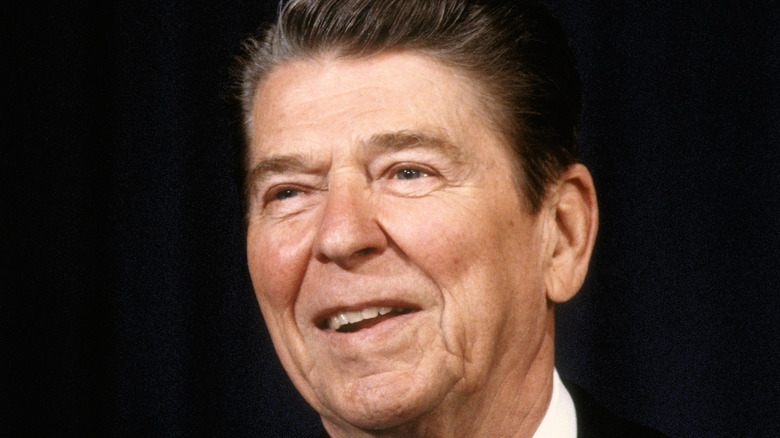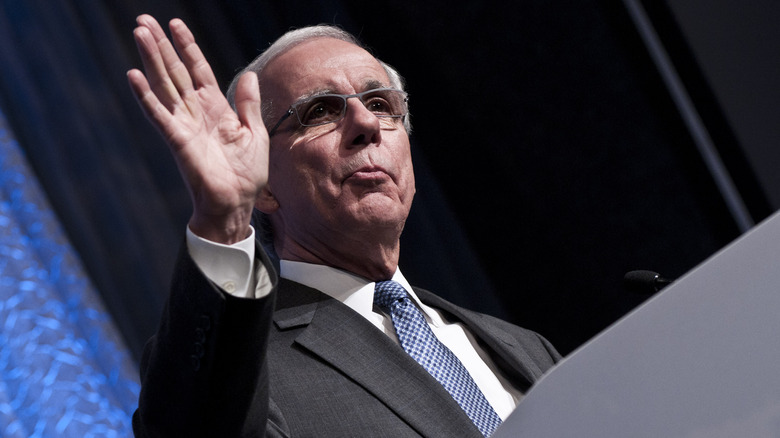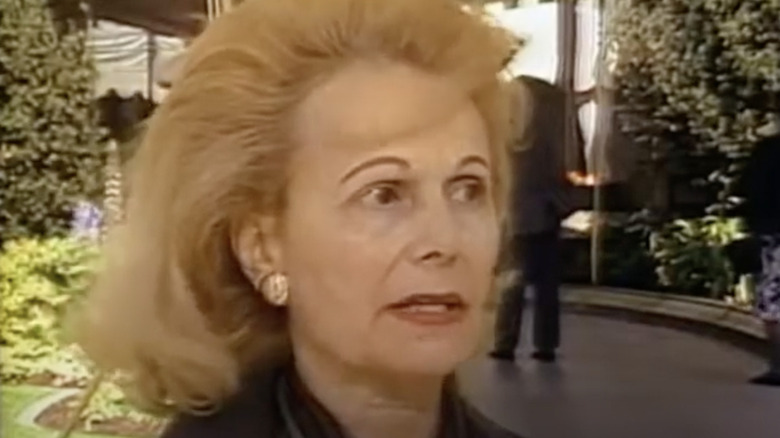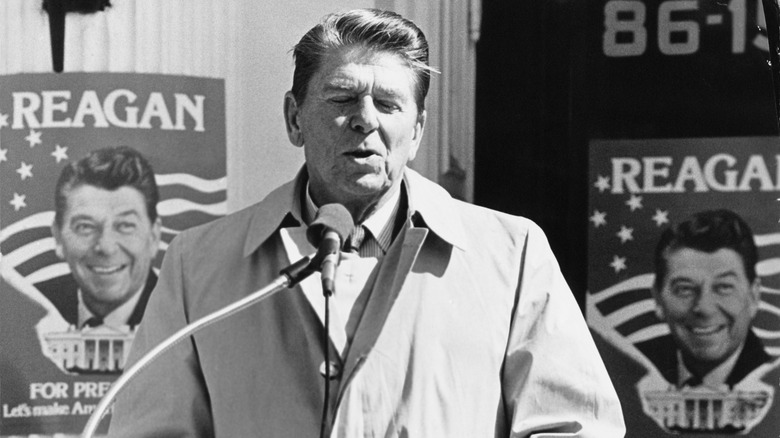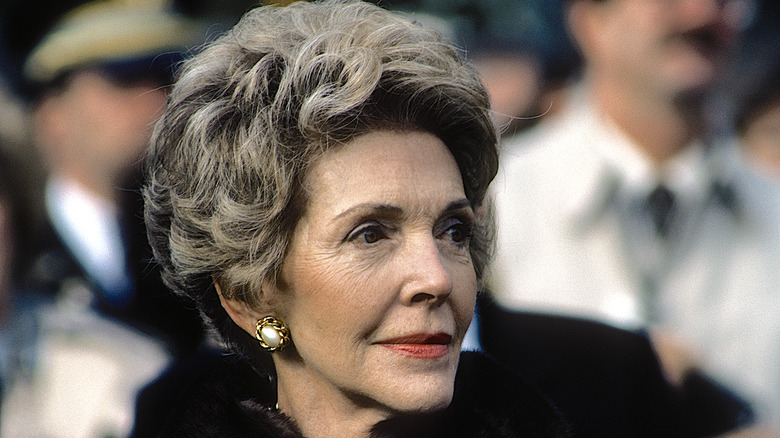Did The Reagans Use Astrology To Make Presidential Decisions?
By the standards of the American presidency, Ronald Reagan's was a strange one filled with a number of idiosyncrasies. Although it wasn't necessarily a surprise that Reagan became the governor of California, to some in the United States, it was a shock and an embarrassment that an actor became president. For a country obsessed with political party purity, in retrospect, it was something of a surprise that just a few years before Reagan was elected the governor of California as a Republican, he was a Democrat, per Time. And Reagan became so synonymous with Jelly Belly jelly beans that literally tons of his favorite treat were delivered to the White House, according to National Archives.
Those were all cute quirks compared to the eyebrow-raising revelation that Donald Regan, Reagan's chief of staff until he was ousted during the Iran-Contra scandal, disclosed. In his 1988 book, "For the Record," Regan wrote, "I have revealed in this book what was probably the most closely guarded domestic secret of the Reagan White House." The secret was that the Reagans were relying on an astrologer as a confidential adviser on all matters. "Virtually every major move and decision the Reagans made during my time as White House Chief of Staff was cleared in advance with a woman in San Francisco who drew up horoscopes to make certain that the planets were in a favorable alignment for the enterprise," Regan wrote. Before long, the astrologer was identified as Joan Quigley.
Washington didn't know what to do
On Capitol Hill, Representative Tony Coelho (above) of California blamed astrology for Republicans reversing course on a trade bill, saying, "Maybe an astrologer is telling them to object today," per The New York Times. Speaker of the House Jim Wright replied: "It's all right with me. I'm glad he consults with somebody." Even Ronald Reagan's own White House spokesman Marlin Fitzwater began his daily press briefing by saying, "I'll take your first question at exactly 12:33 and a half." Michael Dukakis, the Massachusetts governor who was seeking the Democratic presidential nomination that year, had less of a sense of humor about it, saying at a news conference (via the Los Angeles Times), "I hope the nation's destiny beginning in January, 1989, will be based on something other than horoscopes."
It didn't help that tabloids had a field day with the disclosure (per the Los Angeles Times). The New York Post slapped a headline on a story, blaring, "Astrologer Runs The White House." For their part, the Reagans kept quiet about their use of an astrologer because they were concerned that the public would misunderstand exactly the type of information that was being provided. "They both feel that [the report is] unfortunate and a distraction and hardly relevant to the business of government," Fitzwater told journalists at a press briefing, per UPI. However, the public believed that if what Donald Regan wrote in his book was true, the use of an astrologer had everything to do with the business of government.
Not your typical astrologer
Joan Ceciel Quigley was born on April 10, 1927, to a wealthy family in Kansas City, Missouri. Her father, John Quigley, a lawyer, moved the family to San Francisco in the 1940s after buying the storied Drake-Wiltshire Hotel. He and his wife Zelda raised Joan and her sister in the swanky Nob Hill area. According to The New York Times, Joan and her sister were driven about town in a Rolls-Royce, and they were often the topic of conversation in San Francisco's society columns. After attending private school, Quigley went to Vassar and earned a degree in art history. But Joan was drawn to astrology ever since her mother introduced her to it at the age of 15, much to her father's dismay. "It was as though he had sent his daughter to Vassar and I wanted to be a refugee from a gypsy tea room," she later told Salon.
Still, Quigley remained convinced she should be an astrologer, and per Salon, the mentor told her: "Joan, you will be a very famous astrologer some day, and you will discover techniques I have never dreamed of." According to SFGATE, Quigley went on to write an astrology column for Seventeen magazine. Then, her astrology client, Merv Griffin, began bringing her on as a guest for his television program, "The Merv Griffin Show." In the late 1970s, Griffin introduced Quigley to Nancy Reagan, who was then the first lady of California.
Quigley worked on Reagan's presidential campaign
When Ronald Reagan announced he was running for president in 1980, Joan Quigley jumped at the chance to join his team. "I went to work for his campaign in 1980 because he had the most brilliant horoscope I'd ever seen in this country in this century. He could have been a great general," Quigley told The Washington Post in 1988. "His sun is in the mid-heaven, which is the part of the United States horoscope that rules the president. His stars are very lucky for a country."
Quigley liked to say the work she did was technical work, not the stuff of scammers on street corners. "It's not some sort of crystal ball-gazing," she told The Washington Post. "I do political astrology, which means I chart full moons and new moons and ingresses and eclipses and great conjunctions and cycle charts of the major planets." She said the calculations were so complex that without her computer, she wouldn't have been able to give the readings she provided over her career. She added: "I'm quite creative, and I've evolved my own methods. I'm not a pop astrologer."
Nancy Reagan calls on Quigley
It was after March 30, 1981, when John Hinckley Jr. attempted to assassinate President Ronald Reagan, that Nancy Reagan reached out to Joan Quigley for help. The first lady later wrote that, for her, it was a matter of keeping her husband safe any way she could imagine. "Very few people can understand what it's like to have your husband shot at and almost die, and then have him exposed all the time to enormous crowds, tens of thousands of people, any one of whom might be a lunatic with a gun," she wrote in her memoir, "My Turn." "I was doing everything I could think of to protect my husband and keep him alive."
For her part, Quigley told Nancy Reagan that she could have predicted the assassination attempt if she had drawn up the president's charts that day. Per Politico, Quigley said that day was going to be a dangerous one for Reagan. From that point on, Quigley was on a retainer for $3,000 a month from Nancy Reagan, which was paid through a third party to keep Quigley a secret (via The New York Times). The astrologer made up a color-coded calendar that reflected a traffic light. Red days meant he was not to leave the White House, according to the Paris Review. According to Quigley, she never even met the president until 1985, per The New York Times. But when Donald Regan revealed there was an astrologer influencing the White House, Nancy cut all ties to Quigley.
Quigley took her turn, too
Joan Quigley took exception to Nancy Reagan's depiction, telling the Los Angeles Times, "I would participate in a more intimate way than the publicly recognized insiders of greatest importance." And in her 1990 book, "What Does Joan Say?: My Seven Years As White House Astrologer to Nancy and Ronald Reagan," she elaborated: "I was responsible for timing all press conferences, most speeches, the State of the Union addresses, the takeoffs and landings of Air Force One. I picked the time of Ronald Reagan's debate with [Jimmy] Carter and the two debates with Walter Mondale; all extended trips abroad as well as the shorter trips and one-day excursions."
For the most part, Quigley stayed out of the public eye until she died in October 2014 at the age of 87, per obituary in The New York Times. She did, however, take a shot at bringing her horoscopes to the masses during the dot-com boom of the late 1990s. She made her pitch to a number of Silicon Valley investors, asking for an influx of $6 million to $10 million in cash to develop a service that would deliver personalized predictions to paying subscribers (per Salon). Investors were already detecting the forthcoming crash, which, if Quigley predicted, she never said anything about it. Instead, she turned inward as to why she couldn't score the money for her start-up. "Really, I should have known," she said (via Salon). "Struggle has been in my charts."
